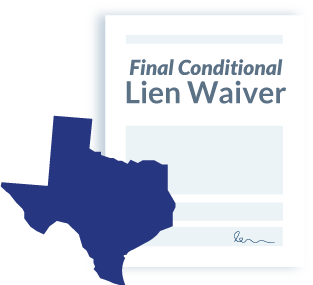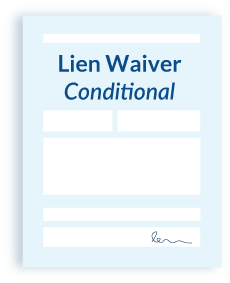
The Texas lien and notice deadlines are brutal. There’s no two-ways about it. Luckily, Texas contractors, subs, and suppliers get a break when dealing with lien waivers. The Lone Star State is one of 12 states that has prescribed statutory forms to take all of the headache out of lien waivers.

Texas lien waiver rules are strict. There are four different types of lien waivers that can be used in the state of Texas. This article is about one of those: the Conditional Lien Waiver and Release on a Final Payment.
Learn more: Read the guide to all of Texas lien waivers and releases
Guide to the Texas Final Conditional Waiver
Let’s not get ahead of ourselves just yet. Before discussing the particulars of this form, it’s imperative to know when it should be used. A Final Conditional Waiver indicates that work has been done, but not all payments have been made. You can read more about the differences between unconditional and conditional lien waiver here. But even if all payments have been promised, or if you’ve received the check but not cashed the check, a conditional waiver could be appropriate. But if work is only partially done, a Partial Conditional Waiver or a Partial Unconditional Waiver may be appropriate.
And last but not least, if work is done and the money is in the bank, a Final Unconditional Waiver may be the move. Final waivers are part of the contractor’s checklist for collecting final payment, but it’s critical that they understand how they work.

Free form download
Download a Conditional Waiver and Release on Final Payment form, prepared by construction attorneys to meet the statutory requirements.
How to Fill Out the Form
First, let’s look at what isn’t there. On the Texas Final Unconditional Waiver, there’s a specific notice that must be printed in bold, (at least) 10 pt font. That notice is not required on this Final Conditional Waiver, though. Here’s what is required:
> Project. What job is this waiver for? If there’s a project name or nickname, that should go here. Use whatever the more official (and correct!) title applies.
> Job No. What’s the job number for this project?
> Maker of check. Who issued and signed the check that was given in exchange for this conditional waiver?
> Payee or payees of check. Who is the check made out to? Or, who can cash or deposit the check? If made out to a company, be sure to use that organization’s name.
> Owner. This one’s pretty easy too. Who owns the project property where lien rights are being waived? Keep in mind, answering this question can get tricky when there’s a developer or apartment/condominium involved. Check out this post: How to Find the Property Owner on a Construction Project.
> Location. Where is the project located? Be sure to give a street address and to include the county and zip code. Any other identifiers could also be helpful. The more specific, the better.
> Job description. What kind of work did you perform on the project? Typically, the more specific, the better.
> Person with whom signer contracted. This one’s easy – Who hired you?
> Signature. That’d be your John Hancock.
> Date. This should be the date the document is signed.
> Company Name. What company or organization do you work for?
> By (w/ title). Print your name and position title, please!
> Notarization. Texas is one of three states that require a lien waiver be notarized
*Note: For projects starting on or after 1/1/22, lien waivers will no longer be required to be notarized
> Tracking. Make sure that you are keeping track of all your waivers through the payment chain

Texas rules for mechanics liens and notices are subject to major changes in 2022.
The information on this page has already been updated to reflect the new rules.
Conclusion
REMEMBER: Conditional waivers are always safer to use than unconditional waivers. An unconditional waiver should only be considered when payment has been made, everything checks out, and the money is literally in the bank. Having a check in hand (that can bounce or be cancelled) is NOT enough, since an unconditional lien waiver will waive your rights even if the check ends up being no good. Signing an unfair waiver happens all the time – so keep an eye out.
![Guide To Texas’ Conditional Lien Waiver — Final Payment [Free Download]](https://www.levelset.com/wp-content/uploads/2018/03/Guide-to-Texas’-Conditional-Lien.jpg)

